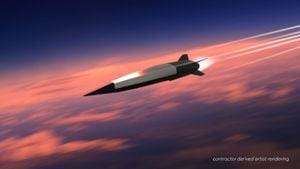SES AI Corporation, renowned for its cutting-edge developments in lithium metal batteries, recently declared monumental progress with its latest battery safety advancements. The company revealed its 100 Ah lithium cells for electric vehicles have successfully passed rigorous safety tests mandated by the Chinese national standard GB38031-2020.
This prestigious standard comprises thorough assessments, including overcharging, thermal management, and crushing, guaranteeing the resilience and safety of these batteries. "Compliance with GB38031-2020 demonstrates SES AI’s 100 Ah Li-Metal cells can effectively manage safety risks under these stringent test conditions," the company reported.
Qichao Hu, founder and CEO of SES AI, emphasized the significance of passing such tests, highlighting it as the first time any high-energy density cell like the lithium metal variety has achieved this milestone. The innovation not only paves the way for safer electric vehicles but also reassures consumers about the reliability of these advanced battery systems.
Founded back in 2012 and based out of Boston, SES AI has quickly made its mark internationally with additional offices spread across Singapore, Shanghai, and Seoul. Their battery technology hinges on employing lithium metal anodes, which are known for high energy density, complemented by specially formulated electrolytes and protective coatings.
The recent safety achievement aligns with SES AI’s long-standing commitment to refining lithium metal chemistry to bolster battery safety. "The results are highly encouraging and affirm our decade-long commitment to refining Li-Metal chemistry," Hu added.
SES AI is not just stopping at automotive applications; the company's future plans also include development for electric aircraft. To kick this off, they're establishing the first production facility for their 30 Ah Li-metal cells dedicated to urban air mobility based out of Chungju, South Korea.
This announcement demonstrates the company's ambition to lead the battery sector not only for land vehicles but also for air transportation. SES AI’s partnership with automotive giants General Motors, Hyundai-Kia, and Honda highlights industry trust.
Earlier this year, SES AI entered the next phase of its developmental agreement with Hyundai, making the firm the sole Li-metal battery player to have automotive B-sample agreements advancing simultaneously. Such collaborations only intensify the momentum SES has built within the electric vehicle sector.
The push for safer lithium-ion technology is gaining wider traction, especially with the increasing scrutiny surrounding battery-related incidents. According to SES AI, their AI system for safety can predict and mitigate nearly all incidents linked to battery failures, showcasing substantial advancements not just technologically but operationally.
Hu noted, "When you combine the GB38031-2020 for abuse and our AI for Manufacturing for managed safety, it ushers us closer to commercializing Li-Metal for EV and urban air mobility applications." This capability positions SES AI to redefine standards for battery production and safety protocols.
The move could alter how safety standards are approached throughout the battery industry, setting new benchmarks for manufacturing practices. All these advancements are especially critical as global markets rapidly expand to include electric and hybrid vehicles, pushing communities toward greener alternatives.
With electric vehicles becoming central to combating climate change, the focus on battery safety is no longer optional but rather mandatory. SES AI’s recent strides suggest they are not only leading the charge technologically but are also proactively addressing potential consumer concerns.
This development stands out as the battery industry navigates the dual challenges of innovation and safety. Demand for electric vehicles is soaring, making advancements like those from SES AI not just important but pivotal for ensuring consumer trust and wider adoption.
For SES AI, the road ahead is paved with opportunities, especially as they solidify partnerships and expand production capabilities. With innovations rooted deeply within safety practices, their commitment to improving lithium metal technology could very well revolutionize the larger electric vehicle market.



